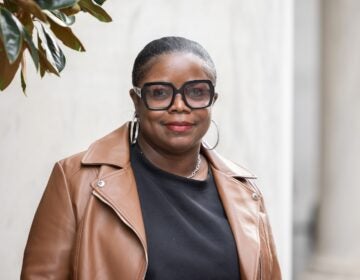Superintendent-search public discussions come to Leeds Middle School
“We’re not going to force people to talk, but we’re encouraging them to talk,” said Harris Sokoloff, director of the Penn Center for Civic Engagement, near the beginning of the public forum held by the School District of Philadelphia at Leeds Middle School on Tuesday evening.
Those in attendance needed little or no encouragement to make their views known. After all, the event was held to get public feedback on the criteria the district has proposed for choosing its next superintendent.
The 40 or so members of the public first met in the East Mt. Pleasant Avenue school’s auditorium for a brief overview of the process of choosing a new superintendent from Sokoloff, School Reform Commission member Feather Houstoun and Lori Shorr of the Mayor’s Office of Education.
They presented the nine criteria — listed at the bottom of this story — which the SRC had determined earlier this year to be key characteristics of the city’s next educational leader.
Thinking big picture
The participants were urged to think about all aspects of running the district, including its financial crunch. As Shorr noted, “There was a $700 million budget gap at the beginning of the year. … The next leadership is not inheriting a district that is fiscally sound.”
Houstoun said that the community engagement sessions would end this Friday and by March 1, the information compiled would be presented in report form to the SRC’s search committee. She said that the SRC hoped to have a new administration in place by early summer.
Before the attendees broke into three small discussion session they were urged to consider three things in particular: what they liked about the criteria, what concerns if any they had about them and whether it was important that the next head of the district come from Philadelphia.
Break-out group discussions
The 14 participants whose discussion group was led by former district educator Germaine Ingram included parents, educators and interested citizens.
Their discussion ranged over a wide range of topics but eventually centered on the relative importance of having someone who was first and foremost an educator leading the district versus the need for an experienced administrator with both political and financial savvy.
Among the attendees comments:
— “I think it’s extremely important to have someone with classroom experience. Finances and so on, other people can deal with that. Why would we have someone running a school district who’s never been in a classroom?”
— “The superintendent is not there to teach. He’s there to make it possible for teachers to teach.”
— “Ideally, the person chosen should not be deficient in any of the nine areas, and that’s going to be a hard person to find.”
— “We can’t keep turning over superintendents every three or four years.”
— “This is not a district to cut your teeth on,” said one, noting a need for experience.
Results will be made public
After more than an hour of discussions, three small groups summarized their main conclusions and brought them out to the hall at Leeds to be posted.
They ultimately focused on changing the district’s “climate of fear” into an air of joy in learning and education, finding someone who can play politics but not be influenced by politics, the need to balance educational and business capability and the ability to foster increased parental involvement.
After the meeting Sokoloff said that the report of the forums’ findings would be posted on the websites of the United Way of Southeastern Pennsylvania’s (www.uwsepa.org) and the Penn Project for Civic Engagement (www.gse.upenn.edu/pcel/programs/ppce).
Nine key criteria for new superintendent
1. A commitment to education and an overall passion to ensure learning for all children
2. Knowledge and capacity to run a large enterprise or organization
3. A clear understanding of the way management decisions affect teaching, training, and leadership development among school principals
4. A team-builder able to coordinate and motivate a diverse group of managers and educators of different types of schools in different types of settings
5. Embraces the idea of a portfolio of schools and advocates for high-quality schools regardless of the provider (district or charter)
6. A relationship builder who is able to build creative partnerships with numerous external stakeholders to bring resources to individual schools and groups of schools
7. Ability to rethink the district’s service model, moving closer to autonomy for individual schools and decreased centralization
8. Ability to influence the public, business community, higher education community, and legislative leaders on the value of public education and the commitments necessary to achieve notable progress
9. Is committed to actively engaging with students, parents and community stakeholders
WHYY is your source for fact-based, in-depth journalism and information. As a nonprofit organization, we rely on financial support from readers like you. Please give today.




